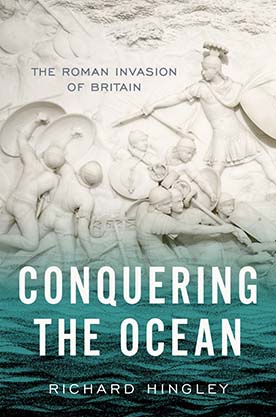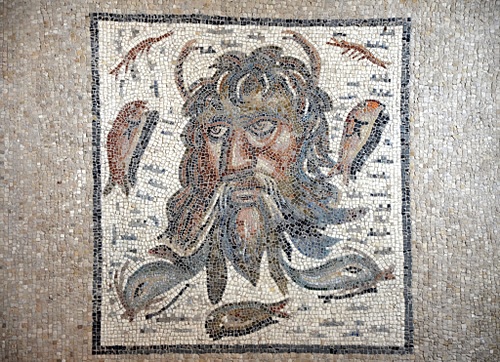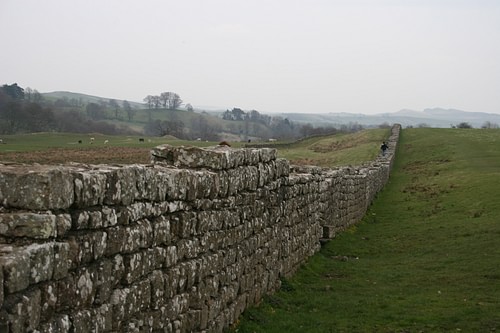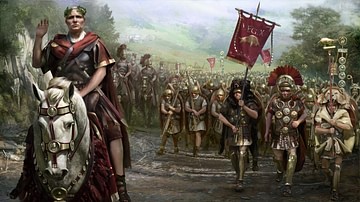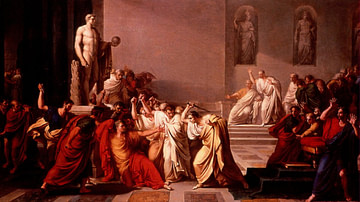In this interview, World History Encyclopedia sits down with author Richard Hingly to chat about his new book Conquering the Ocean: The Roman Invasion of Britain published by Oxford University Press.
Kelly: Do you want to tell us a bit about what the book is about?
Richard: Yes, it is obviously about the Roman conquest of Britain, but that takes some explaining because, I suppose, in the mind of the public, sometimes the Roman conquest is quite a short term thing, perhaps it occurs over a few years, but in reality, it goes on for a long period of time. The first significant episode is when Julius Caesar comes to Britain. Julius Caesar is campaigning in Gaul, which is largely modern-day France, and he decides to go over the ocean to Britain in 55 and 54 BCE. He travels twice with armed forces but ends up leaving with some agreements with leading peoples in Britain, who would have to pay Rome tribute, but he does not actually conquer anything.
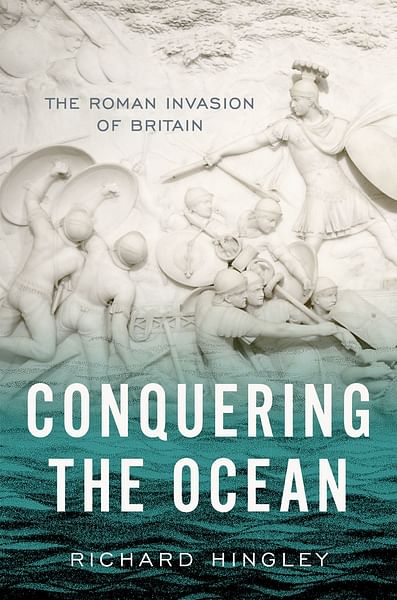
Then, roughly a hundred years later, Emperor Claudius, was in a difficult position in Rome because the senatorial elite, the people who ruled Rome did not really respect him. When he comes to power, Claudius wants a victory, and the best place to do that is Britain. He sends a general and a large Roman army across the ocean – a hundred years after Caesar had been to Britain – and he starts the conquest. That period of conquest goes on from 43 CE right down to the late 1st century CE. At that point, the Romans had conquered most of Britain, but they have to withdraw and further campaigns occur. So, my book goes right up to the building of Hadrian's Wall, about 1900 years ago, in the 120s CE. It covers the whole period from Julius Caesar to the building of the wall.
Kelly: Is there a reason why people might think that the Roman conquest of Britain is a short period of time?
Richard: Yes. I think you have to think about what the Romans were trying to do. Initially, Julius Caesar comes to Britain – and Claudius has a very similar interest – because Britain is a very distant, fabulous place. Julius Caesar tells us that Romans really know very, very little about Britain. By the time Claudius invades, they have much more knowledge about the people of Britain because they are in contact with people in the southeast of Britain between Caesar and Claudius, but they leave Britain alone and just manipulate the rulers of the people in southeastern Britain for a hundred years between Caesar and Claudius. When Claudius comes in, he conquers the southeast very quickly. The whole of the southeast in what is now England falls to the Romans within a few years, but as they campaign further west into Wales and central Britain, the conquest is very difficult. It slows down considerably, and they have to expend considerable effort in conquering these areas. It takes them to the early 80s CE to reach what is southern Scotland.
We have to be a bit careful. I talk about Scotland and Wales, but they are modern terms, we should really talk about southern Britain, western Britain, central Britain and northern Britain. Why the Romans get slowed down in that process is to do with the complexity of dominating all these peoples and also the fact they are always involved in military campaigns in other parts of the Roman Empire. They cannot send an absolutely massive military force – they actually send tens of thousands of soldiers to Britain, but they cannot send hundreds of thousands of soldiers – because those soldiers are needed elsewhere in the empire.
Kelly: Of course. Multiple prongs of attack. Was it also more difficult than they were anticipating?
Richard: Yes. I think there is some indication that is true because, at certain times during the conquest, people make statements that they can complete the conquest quite quickly. For instance, one of the provincial governors, a very senior Roman man, tells the Roman emperor that basically he can complete the conquest of Britain in three or four years. But, he is campaigning in Wales, and at that stage in the 60s CE, they have not conquered any of the central areas of Britain or any of what is now Scotland. The Roman military elite was very arrogant. We do not really know whether they thought they could do things that were unrealistic or whether it was just boasting. In reality, the governor was trying to get the emperor's support by suggesting something that was not practical.
They have an important navy that explores the coast, and they also send people out to interview powerful people in communities beyond the frontiers, but they may only have a very vague view of the geography of Britain until they actually start campaigning further. Perhaps they do not realise how large the island is when they start conquering it.
Kelly: So they do not really know how much land or how many more groups of people they are going to come into contact with. They just assume that in a couple of years they will have it all.
Richard: Imperial powers can be like that. If you read some of British imperial history, you have British administrators and commanders who actually think they can do things that are completely improbable. Imperial hubris, I suppose. If you tell yourself that perhaps, as a military commander, you may be able to do things that otherwise would be very difficult, it can obviously get you into trouble as well. One example is actually relevant to my book because the Romans are campaigning in northwest Wales in 60 CE, and the governor there has probably gone too far. Then there is the famous uprising of Boudicca in eastern England. One of the reasons for that may be that the governor has actually gone too far and is being too ambitious in conquest. He is in the northwest of Wales at Anglesey, he seems to have gone too far, and he loses control.
Kelly: Why did you choose to write this book on this topic? Is it building on previous research or is it just something that you are fascinated about?
Richard: It is a new thing for me to write this sort of book. I have written eight books in total, but this is very different from my earlier research. A lot of my research has been on the history of the way that Roman knowledge is developed, and I actually talk about that in the last chapter of this book, but it is only a short chapter. This one is a sort of historical narrative; I am trying to tell a fairly linear, simple story about the conquest that people can follow very easily.
The reason I wrote it is that when I was young these sorts of accounts were very popular in academia. We had a whole series of books coming out when I was in my formative years that try to tell stories about the conquest of Roman Britain, but that tradition in archaeology has become very unpopular. Archaeologists these days, including me, tend to be far more interested in the lives of people. Our research tends to focus on quite detailed case studies, of the lives of men who are not members of the imperial elite and women and children, and we are interested in slaves and agricultural workers. We have lost interest in archaeology in the actions of emperors and senior military men.
Ancient historians, by contrast, still focus quite a lot of attention on the activities of the emperors. The emperors drive a lot of what happened in Britain, and I, as an archaeologist, wanted to have a think about whether I could write a synthesis that integrated ancient history with archaeology. I have tried to take forward quite a lot of the stories of people who are not members of the imperial elite. So the women and children and auxiliary soldiers in my story. I also think what the emperors believe and do is really fundamental for our understanding of the conquest of Roman Britain. So it was a challenge for me to do it, and I am waiting to see how it goes down with my archaeologist colleagues and whether they like it. It is rather a masculine tale of power, the conquest of Britain, we cannot really write it any other way because the people who drive it are men and they are very senior. I think it is very interesting and I also think people get subjected to the actions of powerful men. We can try and do our research in a way that sort of looks at other issues, but we cannot avoid that in the Roman past or in the modern world.
Kelly: I feel like a lot of my studies were about everyday lives. There has definitely been a bit of a shift. Would you say that it is because the powerful men are the ones that everyone was interested in and we have the most information about them?
Richard: Yes. We have classical texts, and those tend to talk about the activities and the lives of the very wealthy and powerful. The classical texts that address the Roman conquest of Britain are all written by members of the male Roman aristocracy, and they tend, on the whole, to talk about the actions of their peers. Some of them are quite critical, they are not all entirely positive. They also write about people like Boudicca, who is an anomaly because Boudicca is a woman and she rebels against Rome, but the people who write about her are both males. They write about another female leader in Britain called Cartimandua, who they interpret as a very negative figure. Boudicca is different, in one of Tacitus' accounts, Boudicca is quite a positive figure in a way. She rebels because she is very badly provoked by the Roman administration, and that is an attack on Nero, who was seen as a very bad emperor.
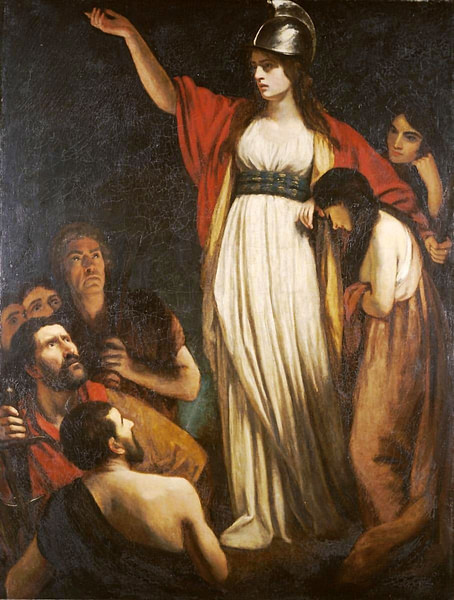
That drives a lot of interest in this sort of topic, the elite attitude to Britain and why the Romans conquered Britain. Archaeologists used to follow that and gender quite closely until the 1970s. Archaeologists are a bit more critical sometimes of power. Classics is a very elite subject in Britain or America, and archaeology historically was also practised by the elite, but it is quite inclusive as a subject, and we tend to be a bit more critical. We have had several generations of people in the archaeology of Roman Britain who got much more interested in average people. Actually, I started my research really by looking at Roman rural settlements.
I wrote the book because I am also really interested in the conquest of Roman Britain. Obviously, I would not have taken it on board otherwise. We have novelists who write about the Roman military occupation of Britain, and we have a very good series of novels on Boudicca. There is a considerable public interest, but the archaeological consideration of the conquest, the books are rather out of date.
I have looked at up-to-date interpretations of the motivations of emperors, and I have looked at the archaeological information for all sorts of people involved in the conquest. If there is a novelist writing a novel about the Roman conquest of Britain, I hope my book will be quite useful in presenting an account that is not 30 or 40 years old.
Kelly: You said it was a fairly new topic for you. What did you find the most interesting or the most fascinating in your research?
Richard: I think it has been tremendously enlightening that we have known for quite a while that Britain has a very special role in elite Roman society. The emperors want to conquer Britain because it is an island, and the Romans had a particular attitude to the sea. They inherited beliefs from the Greeks, and the Greeks saw the ocean as endless. So the world was a big island within an ocean, and they had some knowledge of the extent of the ocean. Alexander the Great had gone right to the eastern extreme of the world that the Greeks knew about, and the Romans inherited these attitudes. Alexander had not gone west in the Mediterranean very much, and he had not gone right to Spain or the west coast of North Africa.
However, another myth is Herakles in the Greek tradition or Hercules as the Romans knew him. Hercules was reputed to have sailed right to the west of the Mediterranean and actually to have gone through the pillars of Hercules, which form the twin sides of that channel, which goes through from the Mediterranean into the Atlantic. We are told the Romans know very little about the Atlantic as you go north of Spain. So, by the time of Julius Caesar, they had already conquered parts of Spain. They know very little about the west coast of the Atlantic going up towards Britain, and the stories about Oceanus and the endless ocean get attributed to Britain. Britain's really special role is that it is an island in the ocean and trying to conquer and dominate Britain is effectively getting the submission of this ancient Greek God Oceanus. Oceanus was one of the original Greek gods, he was a titan, and in Roman society, he was very powerful and significant.
There is an earlier book which looks at this in some detail by somebody called David Braund, and I found that very useful. Following through the conquest of Roman Britain, right from Julius Caesar to Hadrian, I have managed to find some additional things to add, and I think I have managed to reconceptualise this idea about Ocean quite fundamentally. I also believe deeply that Hadrian's activities in Britain (Hadrian comes to Britain one thousand nine hundred years ago in 122 CE) were also deeply informed by their attitude to Ocean. Hadrian is drawing on that oceanic propaganda and perhaps the reason Hadrian's Wall is so significant and substantial is that Hadrian and the Roman elite have this special attitude to Britain as a barbaric and primitive place set beyond or in Ocean. That is something that I have managed to follow through in the book.
I think I found that quite surprising because when I started off doing research, that was a vague interest of mine, and it became absolutely fundamental to the book. All these actions, the reasons the Romans want Britain and the reason they do all this campaigning over the decades and the reason they have so many soldiers in Britain, and the reason Hadrian's Wall is so substantial all have to do with their attitude to Oceanus.
Kelly: That is fascinating. It must have been such a cool thing to work through. I have one more question. What do you think people should really know about the conquering of Britain?
Richard: My feeling is really that we need to get a balance that has probably been coming through all my comments. The reason I would say that is because my experience of talking to people and I am talking about members of the public in Britain and students and fellow academics in America and in Europe, as well as in Britain, is that people tend to split into two sides. A lot of people seem to have a rather beneficial attitude to Rome. I do not think anybody who knows much about Rome would feel Rome is entirely positive. What the Romans did for us is a generally very positive view, and it is often nuanced by people. We are having a critical take on it, too. Roman emperors were dictatorial, though, with some very bad emperors and so on. They were imperialists and they dominated people, killed lots of people, they enslaved people.
I think we need to get a balance because Romans produced a lot of order. I mean, they did actually stop people fighting, and we can document that they improved the economic productivity of the land. Certain people did very well during the Roman conquest and made lots of money and got high status. Other people got marginalised, and the Romans killed and enslaved a lot of people across the empire. Their whole economy was based on slavery. My book is trying to look at these issues, too, and get a balance. I think it really is important for the public to know that Rome was a complex thing.
I think we have things that push that positive attitude to Rome, and I just would like to communicate a more balanced view. I think that is important because Rome is fundamental and foundational to our societies in the West, but Rome just generally has this more positive image. So, nuancing that positive image is pretty important because the world is complex now and it was complex in the past. We need to learn some positive things. That is a really grand aim for a book, but I think it is something I do try to communicate through my research.
Kelly: That is a great overall thing to keep in mind for everyone who wants to read the book. Thank you very much for joining me. It has been a real pleasure talking to you.
Richard: You, too. Thank you very much.

